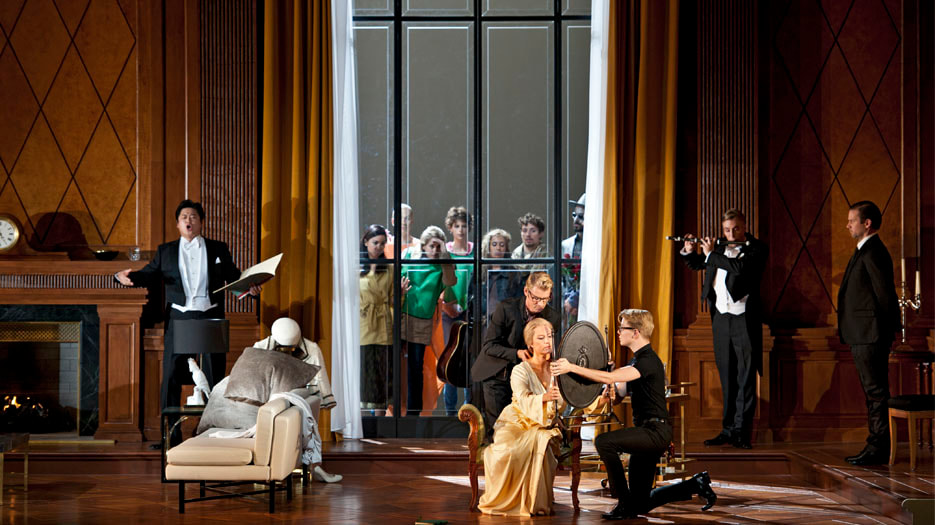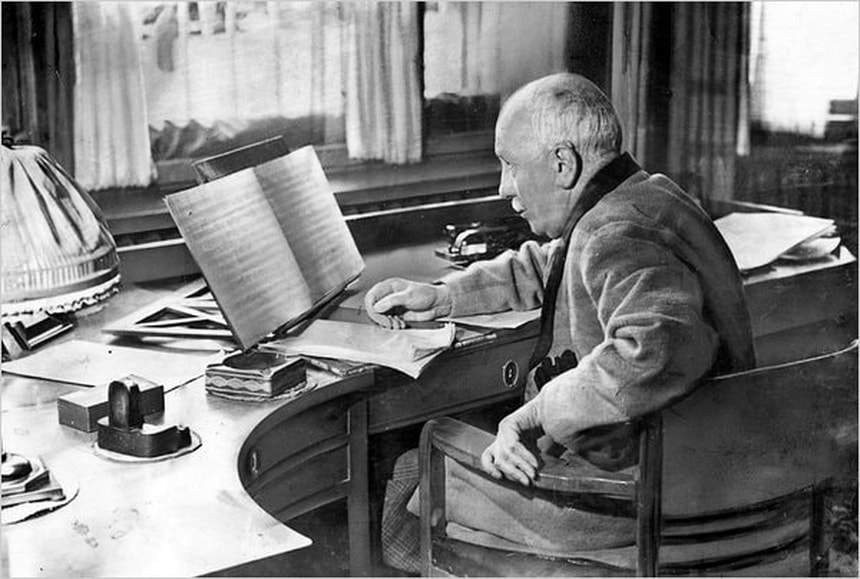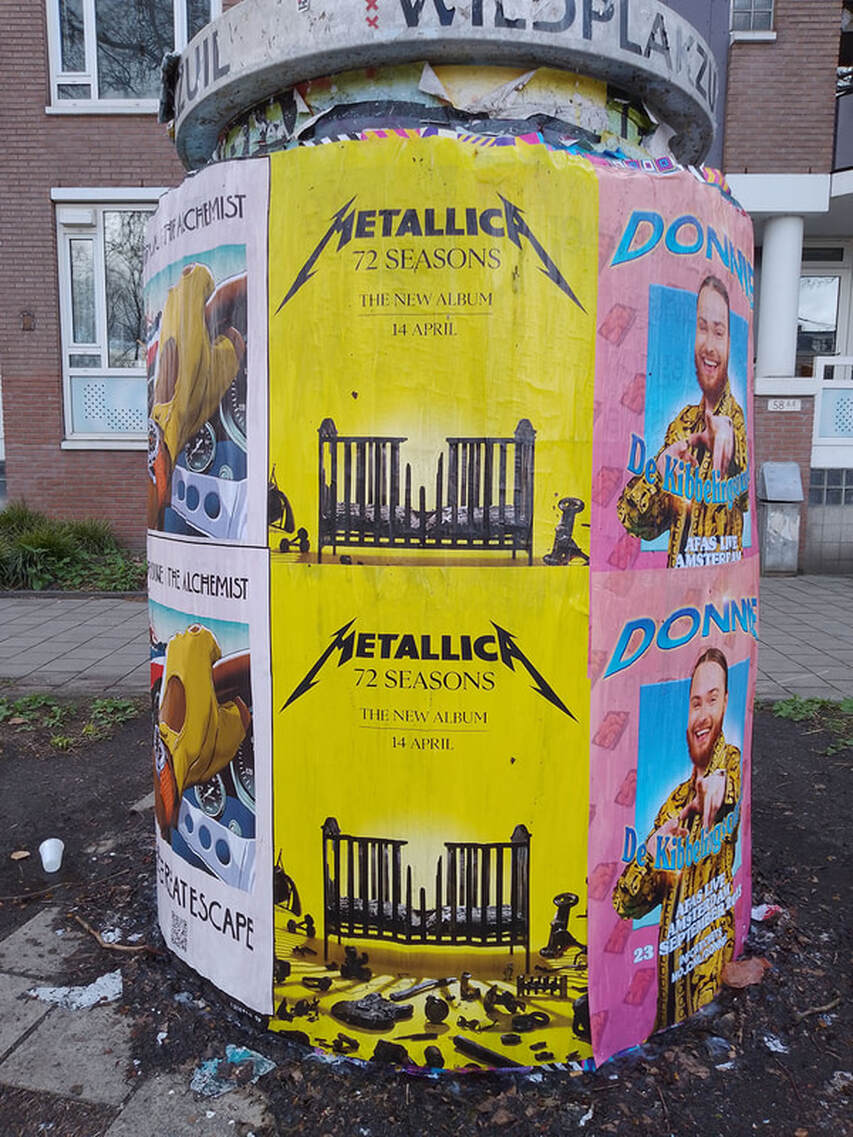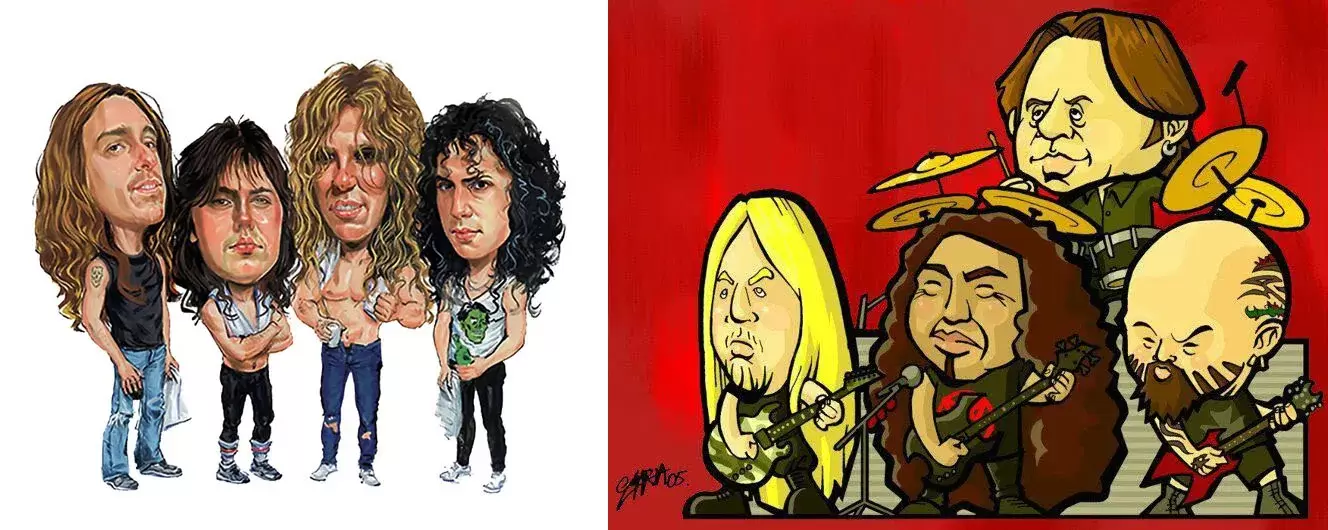Whether reflecting on the past in "Der Rosenkavalier", acknowledging the transitory nature of life in the career and music of Metallica, or the cycle of rise and fall in Wagner's Der Ring des Nibelungen, time is a central theme that reminds us that everything changes and passes.
The, on paper pretty bland story, turned out to be provided with sublime musical commentary by Strauss - full of irony, sarcasm and drama. Moreover, an engaging opera experience could do just fine without dystopian, murderous family relationships. There was life after Elektra, it turned out. And, suprise, the humorous moments turned out to be really funny. The action was perfectly tailored to the text and music. It turned the world of a pseudo-wig time that Strauss and Hofmanstahl had constructed into an electrifying universe. I needed a production like this to convert me to Der Rosenkavalier. Now, in revisiting this production by the Dutch National Opera, 8 years later, the machine of Personenregie appears to be less tightly tuned. Moments where I noted a smile 8 years ago, including the moment when Ochs is stabbed in the leg by Octavian, now go unnoticed. There is, of course, no substitute for the thrill that comes with the power of a discovery, and it’s logical that looking at the same production a second time, happens with a different, more seasoned, pair of eyes. But the regie lacks the finesse that made the earlier incarnation of this production so irresistible. Where the first time I made a triumphant Marx Brothers comparison (A Night At The Opera), this time, instead of humour, melancholy lingered the most. The wistfulness and wisdom of the Marschallin and the descending melody line that provides the sparkling love between Sophie and Octavian with a warning, an afterthought. Lost illusions of love lie ahead, the music seems to want to tell us. The trio at the end is one of heavenly beauty (it was played at Strauss' funeral in 1949). It is extra beautiful because that first gradually ascending melody in which the voices of Marschallin, Octavian and Sophie coincide is not repeated. At most, it is referred to, as much in Der Rosenkavalier's tapestry of sound is a web of references in which the repetition is never just the repetition. In a piece of music where repetition is used most successfully and effectively, repetition is never just the repetition. Our great friend Richard Wagner knew that. His leitmotifs are melodies and themes that recur, but the motifs that sound the same are slightly different each time due to instrumentation and context. They push you back and forth in a world of sound where you can refresh your mind and learn something about life, or even yourself. That endless flow of repeats and near-repeats into which, despite the unpleasant characters and dramatic events that often await you there, you are only too willing to vanish. The art of repetition. John Coltrane also knew how to do that. His sheets of sound are pregnant tapestries of notes that break down a wall, lift a spirit and crack a skull or two. His later work would inspire artists like Terry Riley and it is there, with American minimal music, where things go wrong. Themes on step-and-repeat. After a few minutes, you can go for a beer because there is nothing else to hear. The anticipation for the next note completely sacrificed to the form. As to why repetition sometimes works and sometimes doesn't, one could devote more than a few thoughts. Few things are, for example, as exciting as a repeating, searing metal riff. A powerful musical mean of awesomeness that can maximise expectations but also can lose momentum if, in the context of the bigger whole, it lacks the tension that continues to feed curiosity. I can't help but think of this when I hear the new Metallica. After 40 years in the music business, Metallica are where they need to be and that, along with the respect they earn for that, is also a bit of a problem. They don't have to prove anything anymore. From an underground extreme metal band, they have become a band that fills football stadiums, a band you go to see with the whole family. To object to the band's development over all those years is to object to the fact that they still exist and you don't want that. Metallica are the Marines of Metal, "the first one in and the last ones out" as Scott Ian once aptly said. And you can hate them, as you can hate the Rolling Stones, because they are so settled in the collective memory, because they are so ubiquitous. But when they are on tap, they can still sound irresistibly delicious as the previous full-length album Hardwired... to Self-Destruct with Spit Out The Bone and Lords of Summer proved. So every time the boys of Metallica come out with new material, we look forward to it. As a band, why make the same record over and over again? Why keep evolving as a composer? Richard Wagner could have seen in his third opera Rienzi a formula for success, a basis on which he could mould new operas. But his ambitions prevented that (fortunately). Keeping yourself from changing is perhaps only possible if you are Slayer, Motörhead or AC/DC. In that context, it might be nice to compare Slayer with Metallica for a moment. If you have to choose between Slayer's first album or Metallica's Kill 'Em All, you choose of course Show No Mercy. Slayer all the way. Where Metallica on Kill 'Em All still sounds like a beta-cross pollination of Motörhead and Diamond Head, Slayer is in Show No Mercy already everything that makes Slayer Slayer. Superhuman speeds on guitar and drums that together with Tom Arraya's screams merge into transcendental trash. Had Metallica made the same record 10 more times after Kill 'Em All it would have been nice for those who accuse the band of selling out for more than 30 years now but also nothing more than that. Point is, Metallica had to change after Kill 'Em All because they were not yet where they needed to be. And look what happens next. With Hell Awaits Slayer takes a next step, sure, but Metallica jumps into hyperspace with Ride The Lightning, the mother of sophomore albums. Trash at superhuman speeds with challenging chord progressions in an exhilarating kind of musical drama; Metal Mayhem in an Epic-as-Fuck kind of way. Trouble is though, as the rest of their discography demonstrates, you can only make such a leap once in your career. The moment Metallica got to Master of Puppets, which is perhaps a bit of an overrated album (correspondence about this can be sent to Wagner & Heavy Metal, address: unknown), they have been caught up by the ever-slaying Slayer, who, with their third album Reign In Blood reach the top of the Trashmetal-Everest. The second big leap Metallica made was after Justice For All ... but the Black Album was more of a commercial than a creative breakthrough. And Load was not a jump as well as a descend into murky waters. (Load was necessary to reinvent themselves, to break free from the stranglehold and expectations of a fanbase that had found the holy grail of heavy metal in their first three, or four albums. It was a record that was needed to get back to making music on their own terms but musically it was, well ...). Trash at superhuman speeds with challenging chord progressions in an exhilarating kind of musical drama; Metal Mayhem in an Epic-as-Fuck kind of way. And now there is 72 Seasons, the eleventh album from Metallica in 42 years. A new Metallica is an event just as the release of yet another new remastering of the Solti Ring is an event. An event where the fun is in the anticipation (often more than in the release itself). The songs on 72 Seasons sound a bit thrashier than on predecessor Hardwire, without breaking speed records, and one will search in vain for the epic headbutt-metal of their first four records. At times, thoughts turn to (the aforementioned) Load and Reload. Albums with a kind of metalised hard rock. Albums that have their moments (Until It Sleeps, included in the live set again this tour for the first time in 15 years, is a very underrated song) but albums that, with the best intentions on earth, one can't finish in one, uninterrupted, listening session. 72 Seasons suffers a bit from the same shortcoming. Lux Aeterna, the first single, sounds kind of like Motörhead, but without the dirt (it sounds more like a Lemmy tribute than Murder One on Hardwire was). The first three songs of the album, the title track, Shadows Follow, Screaming Suicide are quite good as individual tracks but with track 4, quite appropriately called Sleepwalk My Life Away, listening fatigue starts to set in. Then the shortcoming wreaks itself that the band regularly pushes its songs beyond their natural length. Then the repetitions in the songs end up in a dead spot. Sometimes it happens that what sounds boring on first listen starts to grow over time and becomes a haunting listening experience (Harvester of Sorrow on Justice ...), but whether that's going to happen here I seriously doubt. The band sounds like they have been economical with ideas. Kirk Hammett relies mainly on the pentatonic scale for his guitar solos but in trying to say more with less, the results sound somewhat laboured and the inventiveness and atmospheric, neo-classical intros and bridges of math Metallica are sorely missed. Longing for things lost in time ... This summer, for the first time in five years, I am going to Bayreuth again. Back to the theatre that Richard Wagner had built especially for the performance of the ultimate cycle of rise and fall, Der Ring des Nibelungen. Looking forward to it. To a new production of Parsifal in which time becomes a space in augmented reality. And Tannhäuser, Tobias Kratzer's fantastic production that was supposed to have its last run of performances this year but is prolonged due to success. But more on that later, no doubt. - Wouter de Moor
0 Comments
Leave a Reply. |
TIMELINE
July 2024
|






 RSS Feed
RSS Feed